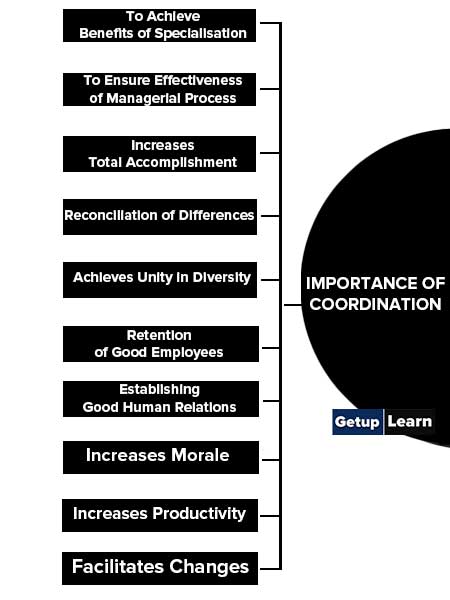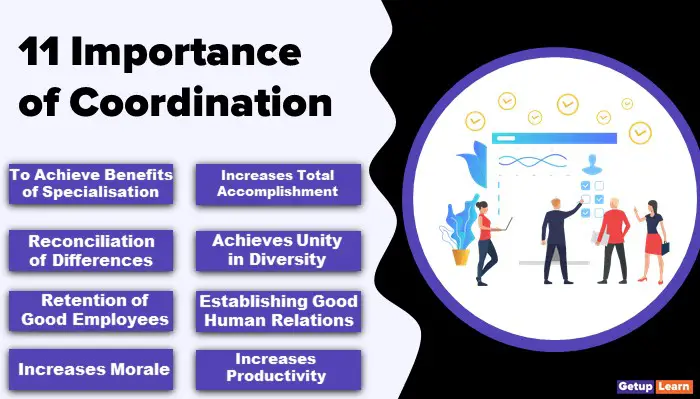Table of Contents
-
1 Importance of Coordination
- 1.1 To Achieve Benefits of Specialisation
- 1.2 To Ensure Effectiveness of Managerial Process
- 1.3 Increases Total Accomplishment
- 1.4 Reconciliation of Differences
- 1.5 Achieves Unity in Diversity
- 1.6 Retention of Good Employees
- 1.7 Establishing Good Human Relations
- 1.8 Increases Morale
- 1.9 Increases Productivity
- 1.10 Facilitates Changes
- 1.11 Others
- 2 Difference Between Coordination and Cooperation
- 3 FAQ Related to the Importance of Coordination
Importance of Coordination
Coordination is essential at every level of management. It is a process of group efforts for achieving business, goals. The quality of management will depend upon the efficiency achieved in coordination.
According to Chester Bernard, “the quality of co-ordination is the crucial factor in the survival of the organisation.” Smooth working and achievement of organisational goals will depend upon sound coordination. The importance of coordination is stated as follows:
- To Achieve Benefits of Specialisation
- To Ensure Effectiveness of Managerial Process
- Increases Total Accomplishment
- Reconciliation of Differences
- Achieves Unity in Diversity
- Retention of Good Employees
- Establishing Good Human Relations
- Increases Morale
- Increases Productivity
- Facilitates Changes
- Others

To Achieve Benefits of Specialisation
The modern age is the age of division of labour and specialisation. To adopt specialisation manager assigns every activity to a specialist by dividing organisational activities into a number of specialised activities and departments.
These specialists perform their assigned tasks without taking into consideration their impact of them on the tasks of others.
In such a case it becomes essential to achieve coordination in the activities of different departments and specialists so that the benefits of specialisation can be achieved. Luther Gulick has rightly observed in this regard, “If subdivision of work is inescapable, coordination becomes mandatory.”
To Ensure Effectiveness of Managerial Process
Coordination makes management processes like planning, organising, directing and controlling, more effective. Establishing coordination among different elements of planning, and different components of organising.
Different techniques of directing and different levels of control make the management process more effective. Mritunjay Banerjee has written in his book, “Co-ordination makes planning more purposeful, organisation well-knit, and control more regulative.”
Increases Total Accomplishment
Coordination increases total accomplishment by checking duplication of work and eliminating or minimising wastage.
The sum total of work done separately by two or more individuals is much less than the sum total of the work done by them with coordination. In simple words, by coordination, efforts are made to make the mathematical sum of 2 and 2 as five.
Reconciliation of Differences
On many occasions in organisations, an individual acts in his own way to achieve the organisational objectives and does not take into his consideration the possible impacts of his acts on his colleagues and other coworkers.
Moreover, different people have different perceptions about the achievement of objectives. This gives rise to differences of opinion among persons working in the organisation. Reconciliation of these differences is considered a necessity for organisational success and efficiency.
Coordination contributes significantly to this end. Koontz writes, “Thus it becomes a primary duty of a manager that he should overcome the difference of interests efforts and procedure and synchronise the individual goals and works so that group goals can be achieved.”
Achieves Unity in Diversity
Today organisations have acquired national and international dimensions. Now people of different ideas, feelings, beliefs, food habits, attires, languages and dialects work together in organisations.
Despite of diversities in persons working, all of them direct their efforts towards the achievement of the common goals of the organisation. Therefore achieving unity among these people of diversity becomes essential. This is achieved properly by coordination.
Retention of Good Employees
People derive job satisfaction by working in a well-coordinated organisation. An employee feels that he occupies a definite place in the organisation, consequently, he is motivated to stay in the organisation for a longer period.
Terry is of the opinion, “Good employees do increase in the organisation by good coordination and they tend to stay in the organisation.” Similarly, McFarland writes, “If job satisfactions are present, executives tend to remain longer with the company. They will feel that they have a place in the organisation.”
Establishing Good Human Relations
It is easy to establish good human relations in a well-coordinated organisation, because in such organisations employees working feel satisfied and have high morale.
Increases Morale
The work environment remains very cordial and cooperative in a well-coordinated organisation, consequently, the morale of employees remains high and they perform their work with interest in the organisation.
Increases Productivity
Employees working in a well-coordinated organisation derive job satisfaction, their morale remains high and they work with interest and devotion, consequently the productivity of the organisation increases.
Facilitates Changes
Changes can be implemented easily in a well-coordinated organisation and they ca also be made acceptable. Such an organisation has the capacity to adapt itself to the changes and welcome them with an open heart.
Others
The following additional points of importance may also be enumerated:
- Eliminates wastage.
- Checks duplication of work and effort.
- Ensures unity of direction and command.
- Minimises cost.
- Increases goodwill of the concern.
- Ensures the success of business in dynamic situations, etc.
Read More About: Coordination: Definitions, Principles, Techniques, Process, Importance, Objectives
Difference Between Coordination and Cooperation
Coordination is an orderly arrangement of efforts to provide unity of action in the fulfilment of a common objective whereas co-operation denotes collective efforts of persons working in an enterprise voluntarily for the achievement of a particular purpose.
It is the willingness of individuals to help each other. Coordination is an effort to integrate effectively the energies of different groups whereas co-operation is the sort to achieve the general objectives of the business.
The following are the points of difference between coordination and cooperation:
| Basis | Coordination | Cooperation |
| Meaning | It is an orderly arrangement of group efforts in pursuit of common goals. | It means mutual help willingly. |
| Scope | It is broader than cooperation which includes as well because it harmonizes the group efforts. | It is termed as a part of coordination. |
| Process | The function of coordination is performed by top management. | The functions of cooperation are prepared by persons at any level. |
| Requirements | Coordination is required by employees and departments at work irrespective of their work. | Cooperation is emotional in nature because it depends on the willingness of people to work together. |
| Relationship | It establishes formal and informal relationships. | It establishes informal relationships. |
| Freedom | It is planned and entrusted by the central authority & it is essential. | It depends upon the sweet will of the individuals and therefore it is not necessary. |
| Support | It seeks wholehearted support from various people working at various levels. | Cooperation without coordination is fruitless & therefore it may lead to unbalanced developments. |
What is the importance of coordination?
The following are the importance of coordination:
1. To Achieve the Benefits of Specialisation
2. To Ensure the Effectiveness of the Managerial Process
3. Increases in Total Accomplishments
4. Reconciliation of Differences
5. Achieves Unity in Diversity
6. Retention of Good Employees
7. Establishing Good Human Relations
8. Increases Morale
9. Increases Productivity
10. Facilitates Changes
11. Others.

















